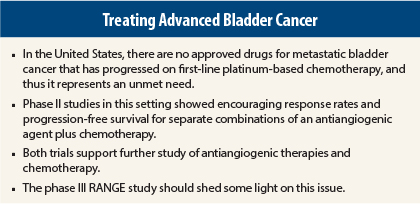Two separate phase II studies lend support to the concept of antiangiogenesis in advanced bladder cancer. The combination of an antiangiogenic agent and chemotherapy may fulfill an unmet need in this disease, the studies suggest. Both studies were presented at the 2015 Genitourinary Cancers Symposium.
The first study offered proof of concept for using the combination of pazopanib (Votrient) and weekly paclitaxel.1 However, for now GlaxoSmithKline has halted the development of pazopanib for bladder cancer. The second study was positive for the combination of ramucirumab (Cyramza) and docetaxel, and a phase III study comparing that combination with docetaxel alone has been mounted in the second-line setting.
“We are moving forward with the antiangiogenic approach [in bladder cancer]. These studies provide proof of concept that the target is worthy of pursuit,” said Matthew Galsky, MD, Director of Genitourinary Medical Oncology at Icahn School of Medicine at Mount Sinai, New York, who was not involved in either of these trials.
Dr. Galsky said that the first randomized phase III trial of antiangiogenic therapies in this setting, CALGB 90601, has completed accrual and is ongoing. That trial is comparing gemcitabine/cisplatin plus or minus bevacizumab (Avastin). “We are waiting for results of this trial. In addition, there may be other antiangiogenic drugs that will be found useful,” he added.
Paclitaxel Plus Pazopanib
“Although platinum-based combination chemotherapy achieves good responses in metastatic bladder cancer, patients will recur, and effective treatment is an unmet need,” stated lead author of the phase II study Sandy Srinivas, MD, Stanford University School of Medicine, Palo Alto, California.
“Many drugs have been tested in metastatic disease, but none is approved in the United States,” she added.
The combination of pazopanib plus weekly paclitaxel achieved high response rates and was tolerable. Based on the positive results, a phase III trial was mounted. In August 2014, GlaxoSmithKline halted development of pazopanib, leaving the combination treatment in limbo. It is possible that another drug company will pick this up and go forward, but for now, that is unknown.
The phase II study combined pazopanib with weekly paclitaxel, based on data suggesting that this combination would be effective.
Patients with pretreated recurrent urothelial cancer were included in the study (n = 32). The median age was 67 years; patients were predominately male; 34% had upper tract tumors; 50% had two prior chemotherapy regimens; 28% had liver metastases. The median time from the last chemotherapy was less than 3 months in more than 50% of patients.
A two-stage design called for stopping the trial if no response was observed in the first nine patients, but that did not happen.
The most common adverse events included fatigue, diarrhea, nausea/vomiting, and neuropathy. There were few grade 3 and 4 adverse events. Febrile neutropenia occurred in 6%, and 44% of patients required growth factor support.
The overall response rate was 50%; there were 3 complete responses, 12 unconfirmed partial responses, and 11 confirmed partial responses. These response rates are encouraging compared with expected response rates in this setting, Dr. Srinivas said. One patient is still alive 55 months later, she added.
Responses were seen in both high- and low-risk patients. Dose modifications of pazopanib were employed in the majority of patients.
Ramucirumab Plus Docetaxel
Interim results of a randomized phase II trial showed significant improvement in progression-free survival with ramucirumab plus docetaxel as second-line therapy for advanced metastatic urothelial carcinoma,2 supporting further evaluation of this combination.
“These patients have limited therapeutic options,” said lead author Daniel Petrylak, MD, Yale University Cancer Center, New Haven, Connecticut.
“Interim results of the phase II trial support the initiation of a phase III registration trial called RANGE. This study will compare docetaxel and ramucirumab vs docetaxel plus placebo in locally advanced or unresectable or metastatic urothelial cancer that has progressed on first-line platinum therapy,” he told listeners.
The open-label, multicenter, phase II trial conducted in the United States and Canada randomized 139 patients to one of three arms: docetaxel with ramucirumab, docetaxel with icrucumab, or docetaxel alone. Patients were treated until disease progression. The icrucumab arm failed to show any meaningful benefit, and that drug is not expected to be pursued further in bladder cancer.
At an interim analysis, median progression-free survival was 22 weeks with ramucirumab plus docetaxel and 10.4 weeks with docetaxel alone. Subgroup analysis showed that all groups benefited from the combination.
Overall survival in the ramucirumab plus docetaxel arm was more than 11 months at the time of the analysis, but survival data are not yet mature. Again, this is considered to be better than that expected from historic controls.
“Ramucirumab reduced the risk of disease progression by 61% compared with docetaxel,” Dr. Petrylak said.
Toxicities that occurred in more than 5% of patients on the combination arm were fatigue, febrile neutropenia, pneumonia, diarrhea, and stomatitis. ■
Disclosure: Dr. Galsky has received research funding from Bristol-Myers Squibb, Novartis, Dendreon, Celgene, and Janssen; is on the adisory board of Merck, Lilly, Novartis, and Astellas; has served as a consultant for BioMotiv; and has stock in Dual Therapeutics. Dr. Srinivas reported no potential conflicts of interest. Dr. Petrylak has served as a consultant or advisor to and received research funding from Eli Lilly and Co, Genentech, and Sanofi and has travelled on behalf of Genentech and Sanofi.
References
1. Srinivas S, Narayanan S, Harshman LC, et al: Phase II study of pazopanib with weekly paclitaxel in refractory urothelial cancer. 2015 Genitourinary Cancers Symposium. Abstract 294. Presented February 27, 2015.
2. Petrylak DP, Tagawa ST, Kohli M, et al: Interim results of a randomized phase 2 study of docetaxel with ramucirumab versus docetaxel in second-line advanced or metastatic urothelial carcinoma. 2015 Genitourinary Cancers Symposium. Abstract 295. Presented February 27, 2015.





